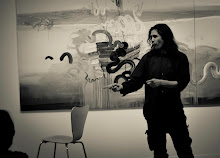One of the things I think I love most about performing thought, is how fun it is. I mean, of course it is wacky, and you need to be careful, not to confuse the audience or pastiche the thinkers. But it is fun, taking ideas, turning them into muses with boots on, and introducing those muses to people who have never met them before. It makes the ideas into living entities once again: Thoughts with their own power, their own passion, their own ability to take over or to stimulate minds. What is more, if you are careful the audience will hear and enjoy ideas that are really on the printed page fairly tricky and abstract; but which are, as living word-creatures, vital, real and palpable.
What | hope the show opens up for people, is another way to think about their own ideas, and ideas in general. I mean we tend to think of ideas as something very page-based, and so potentially abstract and removed form vibrancy. By returning then the ideas to their intense roots, I hope I show that what makes a great idea, and what gives it its simple urgency, and defines it as genius, is its ability to live beyond a page. A great idea in a sense is very like a human. They are easy to grasp and see, and even relate to, and yet they are full of infinite subtlety, and surprise, and it is this human (but also strangely monstrous) element, I feel that the show articulates so well, and which the audience tell me afterwards, moves them and makes them think.
But see what you think - this playlist takes you through most of my latest show in Bristol:
What is Stand Up Philosophy

- matthew hammond
- This blog charts my attempts, in whatever way I can, and whenever I can, and as honestly as possible, to stand up for thinking - real thinking, whether in philosophy or politics, or maths - Because thinking needs standing up for!

Monday, June 17, 2013
Sunday, June 16, 2013
keeping the show moving onwards
There is nothing more important, when you are doing stand up thought, than working out the rhythm of the audience. I mean the exact level the audience will work at together, to enjoy the show: That is, how they will react together, and catch each mood, and how this dynamic element is effecting what they are thinking and (hopefully) enjoying about the show.
This element really matters, and it is this feeling the audience generates which I think makes or mars the show. The problem is of course that the audience are alway rather apprehensive when the performance starts. They are worried, about what the show will involve (what after all is stand up philosophy?), but also they are always worried about whether they will understand the pieces, a fear that is so real, and very understandable. As the performer one has to break into this fear, and make
Everything ok. But one can never do it alone from the front of the house, so one needs to get everyone on board, together as soon as possible.
In recent shows I have sought to do this in three ways. Firstly I make sure the most intense pieces are right at the beginning of the show. These pieces are the poetic and multi-layered works of Foucault and Deleuze. These are the pieces, which are for me as a philosopher so critical, and yet which could be fairly challenging for those (the majority) who are encountering these thinkers for the first time. By presenting them at the start, I deliberately worry the audience, while intriguing them with the language of these pieces, which is highly polished and rhythmic. The pieces serve then, I hope to get the audience's ear into the show, but you must be careful, because it scares them too . So the third piece I do is one of my storytelling philosophical classics complete with audience participation, and irreverent humour. The relief is palpable...what is more as it is integral to this story that philosophy often difficult when it is trivial, the audience kind of feel included ( I hope)- their fear has been reflected back at them, and they have laughed at it....
My second main strategy revolves around powerful one liners, the kind of things one will remember and do so long after the show is over. These one liners, memorable phrases abound in the kind of thinker I deal with, and I design the show to make them shine out. The audience then know they are getting something, will keep something in memory, and that is a lot of the battle.
Finally one does need to crack on with the show. It is a fatal mistake to tarry, the audience must not tire.So I crack on at a pace, keeping the rhythm of explanation and performance tight and carefully measured, so that the show does not feel at all long, which would be fatal to it.
In my last two shows this strategy appears to have paid off, as the audience have been very generous in their remarks afterward, but I will soon post up the shows, so you can judge for yourself.
Thursday, June 6, 2013
Enter the hell's kitchen
Have you ever wondered what a philosophers mind sounds like? Tonight the standing up for freedom edition will be the enter the hell's kitchen special. The noisy place of he philosophers mind, with all its stroppy muses will be recreated for one night only. So come along to st Nicholas of Tolentino in Easton Bristol,and hear what that book of freedom might sound like !
Subscribe to:
Posts (Atom)